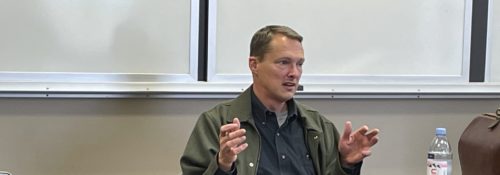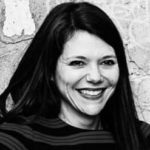
Journalism in a Changing Age
Written by Meghan Barnes
I recently had the privilege of interviewing Barton Swaim, author and editorial writer for The Wall Street Journal and this semester’s Eugene C. Pulliam Distinguished Visiting Journalism Fellow. Aspiring writers, take heart, though Swaim likes to hark back to the imprisoned days of Joseph from the Book of Genesis to describe the probable career trajectory of the future journalist, he is only sort of kidding.
“The demand for journalism will always be there,” Swaim said. “People are not going to suddenly not want to be informed. Even if it feels that way sometimes. There will always be a desire among people prepared to pay for the service for accurate, timely, quality information that’s well written and well presented. And if that gets harder to find, it doesn’t mean the demand is going way; it just means there’s a lot of garbage out there.”
That’s why Swaim encouraged the journalism students in his one-credit course to expect to end up, at least for a time, where they don’t want to be.
“The industry is going to change, but you will find your place in it if it’s the thing you want to do and you can’t see yourself doing anything else.”
Swaim became a journalist after earning degrees in English and theology, topics he says always come up, even in an industry absorbed in the here and now.
“I’ve never known anybody who studied English as an undergrad and regretted it,” Swaim said. “Classic works of literature are everywhere. These books are always going to come up in your life, and you’ll always have to remember them.” Likewise with theology, a topic that surfaced for Swaim in his recent interview about cancel culture with world-famous psychologist Jordan Peterson.
“Theology always seems to come up, no matter what, even in a secular age,” Swaim said. “The Bible is always talked about. Talked about ignorantly a lot, but it’s talked about. Jordan Peterson talks about the Bible all the time. I don’t really agree with a lot of what he says, but it’s just everywhere. So that theology degree has been invaluable to me.”
Surprisingly, though social media and journalism seem to go hand-in-hand, Swaim has forsaken social media—especially Twitter, which he says gives him “cognitive dissonance”—and noted in his course that it may be funny for a middle-aged man to wag a finger at his students and tell them to be careful what they put online, but it’s a serious thing. He emphasized being aware of one’s corporate orbit—because you never know who may become your boss.
“Several high-functioning, highly intelligent journalists over the past few years did not get jobs or fellowships because at some point in their career they went after somebody they shouldn’t have gone after. I don’t know what the governing principle here is, other than to say, be careful who you go after in a big way.”
Ultimately, Swaim’s course, titled “Objectivity in Journalism,” hit home an idea that most journalism students won’t hear from their professors, and that is this: objectivity in journalism does not exist.
“I believe in fairness and honesty, and in hard work and charity,” Swaim said. “Not objectivity. Belief that one sees the world with objective eyes leads to arrogance, laziness, and stupidity.”
 Meghan Barnes is communications coordinator for public relations and media outreach at Hillsdale College. She has lived in Hillsdale since 2012, has three daughters, and is married to psychology professor Collin Barnes. When not writing for the College, Meghan is trying not to look at her phone, working in the yard and garden, or trying to find a way to perform on stage at The Sauk.
Meghan Barnes is communications coordinator for public relations and media outreach at Hillsdale College. She has lived in Hillsdale since 2012, has three daughters, and is married to psychology professor Collin Barnes. When not writing for the College, Meghan is trying not to look at her phone, working in the yard and garden, or trying to find a way to perform on stage at The Sauk.
Published in April 2021